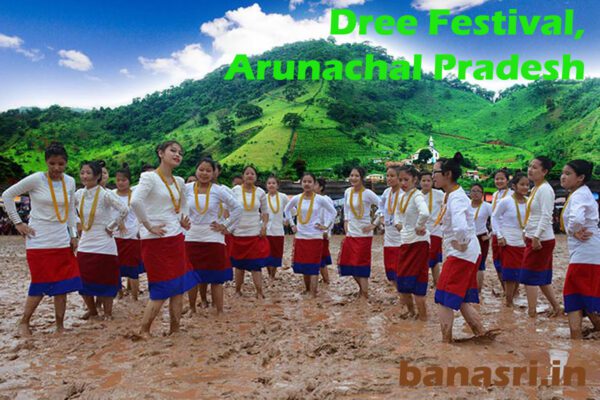
Dree Festival, Arunachal Pradesh: A Celebration of Agriculture and Prosperity
Introduction
The Dree Festival is a significant agricultural festival celebrated by the Apatani tribe in the Ziro Valley of Arunachal Pradesh, India. It is one of the most important festivals for the Apatani people, marking the start of the sowing season and seeking the blessings of the deities for a bountiful harvest. The festival is a vibrant mix of religious rituals, cultural performances, and community feasts.
Timing of the Festival
- When: The Dree Festival is celebrated annually on the 5th of July.
- Significance: The festival is held to ensure a good harvest, protect against pests and diseases, and bring prosperity and well-being to the community.
Locality of the Festival
- Where: The main celebrations take place in the Ziro Valley, located in the Lower Subansiri district of Arunachal Pradesh.
- Communities Involved: The festival is primarily celebrated by the Apatani tribe, but it also attracts participation from other communities and visitors from different parts of the state and country.
Nature of the Festival
- Type: The Dree Festival is an agricultural and cultural festival involving traditional rituals, dances, music, and communal activities.
- Essence: The festival emphasizes the importance of agriculture in the Apatani community, celebrating the connection between humans, nature, and the divine.
Highlights of the Dree Festival
Ritualistic Celebrations
- Prayer Offerings:
- Rituals: The festival begins with the priests, known as Nyibus, performing rituals and making offerings to the four main deities – Tamu, Metii, Danyi, and Harniang.
- Significance: These rituals are conducted to invoke the blessings of the deities for protection against natural calamities, pests, and diseases.
- Specialty: The offerings typically include rice beer, chicken, and other agricultural produce, symbolizing gratitude and devotion.
- Sacrificial Ceremonies:
- Ceremony: Animal sacrifices, particularly of fowls and pigs, are performed as part of the rituals.
- Importance: These sacrifices are believed to appease the deities and ensure their favor for a successful harvest.
- Specialty: The sacrificial rituals are conducted with strict adherence to traditional customs, reflecting the deep-rooted spiritual beliefs of the Apatani people.
Cultural Performances
- Traditional Dances and Music:
- Performances: The festival features a variety of traditional dances and music performed by both men and women.
- Significance: These performances showcase the cultural heritage of the Apatani tribe and celebrate their agricultural lifestyle.
- Specialty: The dances, such as Daminda, are performed in colorful traditional attire, accompanied by rhythmic folk music and songs.
- Folk Songs and Narratives:
- Songs: Folk songs narrating the history, myths, and legends of the Apatani people are sung during the festival.
- Importance: These songs preserve the oral traditions and pass on cultural knowledge to younger generations.
- Specialty: The use of traditional instruments like the Dam Aro (a type of drum) adds a unique musical flavor to the celebrations.
Community Feasts and Gatherings
- Feasting:
- Event: Communal feasts are an integral part of the Dree Festival, where people come together to share food and drink.
- Significance: These feasts symbolize unity, prosperity, and the sharing of agricultural bounty.
- Specialty: Traditional Apatani dishes, including rice, fish, meat, and vegetables, are prepared and enjoyed by all.
- Social Bonding:
- Gatherings: The festival provides an opportunity for social gatherings and interactions among community members and visitors.
- Importance: These gatherings strengthen social bonds and promote communal harmony.
- Specialty: The atmosphere of camaraderie and joy during the festival fosters a sense of belonging and collective well-being.
Agricultural Competitions and Exhibitions
- Competitions:
- Events: Various agricultural competitions, such as rice planting and harvesting contests, are organized.
- Significance: These competitions highlight the agricultural skills and practices of the Apatani people.
- Specialty: Participants demonstrate their expertise in traditional farming methods, emphasizing the importance of agriculture in their daily lives.
- Exhibitions:
- Displays: Exhibitions showcasing local agricultural produce, handicrafts, and traditional tools are set up.
- Importance: These exhibitions promote local products and provide a platform for artisans and farmers to display their work.
- Specialty: The display of Apatani bamboo crafts, handwoven textiles, and other handmade items attracts the interest of visitors and tourists.
Specialty of Dree Festival
- Cultural Significance: The festival is a vibrant display of the Apatani tribe’s cultural heritage, showcasing their agricultural practices, rituals, and traditional performances.
- Agricultural Focus: Dree Festival emphasizes the importance of agriculture in the Apatani community, seeking divine blessings for a good harvest and protection against adversities.
- Community Bonding: The festival fosters a strong sense of community and togetherness, as people come together to celebrate, share food, and participate in various activities.
- Tourist Attraction: The unique rituals, cultural performances, and scenic beauty of Ziro Valley make the Dree Festival an attractive event for tourists and visitors.
Conclusion
The Dree Festival of Arunachal Pradesh is a unique celebration that highlights the agricultural heritage, cultural richness, and communal harmony of the Apatani tribe. Held in the picturesque Ziro Valley, the festival not only seeks divine blessings for a prosperous harvest but also strengthens the social fabric of the community. Through its diverse rituals, dances, music, and communal activities, the Dree Festival provides a platform for cultural preservation, agricultural promotion, and social unity, making it a truly enriching experience for all who attend.

I am really inspired with your writing abilities as smartly
as with the structure on your weblog. Is this a paid subject matter or
did you modify it your self? Anyway stay up the nice high quality writing,
it’s rare to peer a great blog like this one these days. Blaze ai!